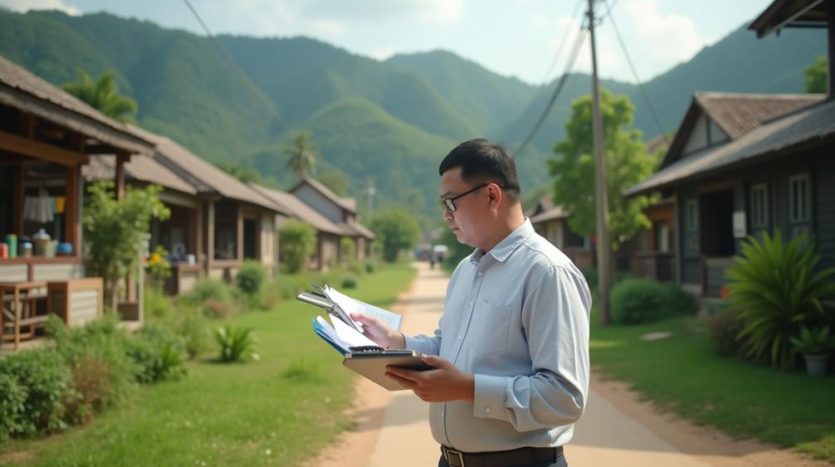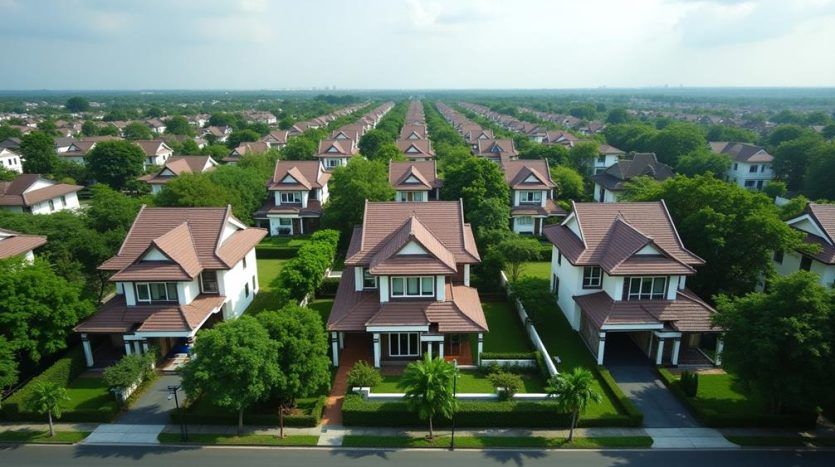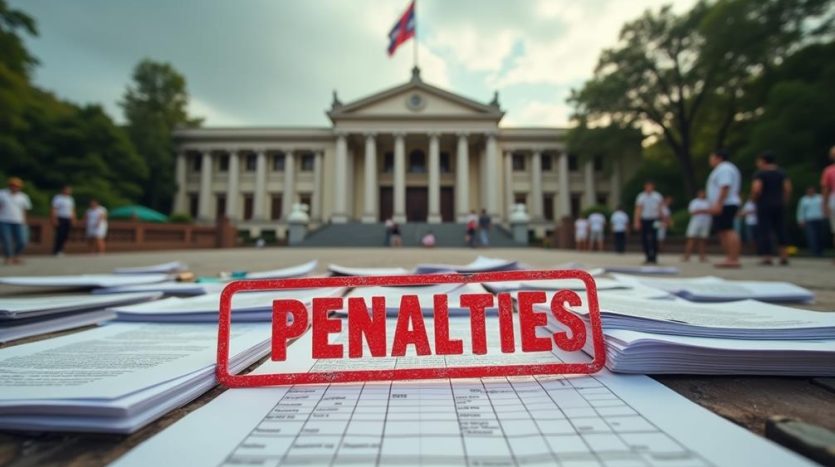Is There Property Tax in Thailand?
When considering property investment in Thailand, you'll need to understand the nuances of property tax. Thailand imposes two main types of property taxes: the House and Land Tax for rental properties and the Local Development Tax for landholders. Both aim to support local infrastructure, with varying rates based on property use. You might think this means high costs, but there are notable exemptions and reductions, especially for agricultural land. Curious about how these taxes have evolved and what the future holds for property owners in Thailand? There's more to uncover about this fascinating topic.
Key Takeaways
- Thailand has two main property taxes: House and Land Tax and Local Development Tax.
- Land and Building Tax applies to land, buildings, and condominiums with annual payments.
- Local Development Tax funds local infrastructure projects based on land value.
- Tax rates vary by property type, with commercial properties taxed higher than residential.
- Significant exemptions available for agricultural land and first-time homebuyers.
Overview of Property Tax
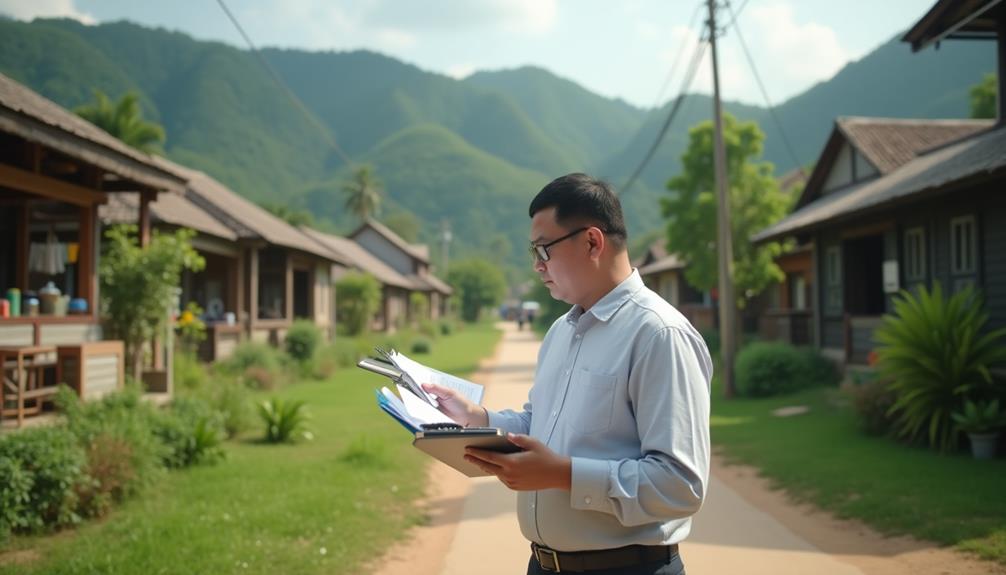
When it comes to understanding property tax in Thailand, the key is recognizing its dual structure: the House and Land Tax and the Local Development Tax.
Now, before you start imagining a tax collector lurking behind your garden gnome, let's break it down. If you have property ownership in Thailand, you're dealing with two main tax implications.
First, the House and Land Tax. This one's for when you own a house or land and decide to rent it out. Think of it as a polite nudge from the government saying, "Hey, you're making money off this place; we'd like a slice too."
Then there's the Local Development Tax, which focuses on land ownership. If you're sitting on a plot of land that's just collecting sunshine, you'll still owe some taxes to help local infrastructure.
Additionally, foreigners can't directly own land in Thailand, and lease agreements typically last up to 30 years.
Sure, it's a bit of a balancing act, but understanding these will help you keep your financial ducks in a row.
Historical Context
To understand Thailand's property tax system, you need to look at the early taxation practices that laid its foundation.
Over time, significant tax reforms have shaped the current landscape, reflecting the nation's evolving economic needs and governance.
Modern property taxation in Thailand is the result of these historical developments and continues to adapt to contemporary challenges.
Early Taxation Practices
How did early taxation practices shape the economic landscape of Thailand? Well, let's take a trip back in time.
In ancient Thailand, tax collectors probably weren't your best friends. Ancient taxation practices were primarily influenced by the agrarian economy and cultural influences of the time. Rice paddies, not skyscrapers, were the prime real estate, and guess what? They were heavily taxed.
Kings and local rulers didn't just demand a tribute of crops; they also levied taxes on land and labor. Imagine having to give up a chunk of your harvest while dodging the occasional tiger.
These taxes weren't just about enriching the royal coffers, though. They funded infrastructure, like the ancient canals that kept those rice paddies fertile.
Cultural influences can't be ignored either. Thailand's Buddhist values encouraged a sense of communal responsibility, subtly pushing folks to pay up without too much grumbling. Your karma might've taken a hit otherwise.
Tax Reforms Evolution
Tax reforms in Thailand have undergone significant transformations, reflecting the country's shifting economic and political landscapes. You can't understand the present without appreciating how past tax policies have evolved.
From the initial attempts to create a robust tax system, Thailand has faced numerous administrative challenges and compliance issues. Each reform aimed to balance economic impact and public perception while grappling with regional differences.
Feeling a bit overwhelmed? Here's how the historical journey of tax reforms might resonate with you:
- Economic stability: Picture a rollercoaster—every tax policy change aimed to keep the ride smooth, but not without a few unexpected drops.
- Public backlash: Imagine trying to get a cat into a bath—that's how the public often reacted to new taxes.
- Administrative hurdles: Think of assembling IKEA furniture without instructions. Enough said.
- Regional disparities: Like trying to fit square pegs into round holes, some policies just didn't fit all regions.
- Global comparisons: Ever compare your lunch to a Michelin-star meal? Thailand's tax reforms sometimes felt like that.
Navigating these transformations has had significant investment implications, often leaving investors comparing Thailand with international tax climates. Each reform was a step towards modernizing the tax landscape, even if it sometimes felt like two steps back.
Modern Property Taxation
While reflecting on the historical journey of property taxation in Thailand, it's clear that modern property tax policies are the culmination of decades of reforms and iterations. You can't talk about today's tax administration without appreciating the labyrinth of past adjustments. The Land and Building Tax Act of 2019 is a prime example, enacted to streamline tax collection and address compliance challenges. This act replaced the outdated House and Land Tax and Local Development Tax, which were admittedly as effective as a chocolate teapot.
Here's a snapshot to help you grasp the evolution of Thailand's property tax framework:
| Year | Reform/Act | Purpose/Impact |
|---|---|---|
| 1932 | House and Land Tax | Initial taxation on property ownership |
| 1965 | Local Development Tax | Revenue for local infrastructure |
| 2019 | Land and Building Tax Act | Streamline and modernize tax administration |
| Ongoing | Digital Tax Administration | Easing compliance through online platforms |
| Future | Planned Reforms | Addressing remaining compliance challenges |
The modern approach emphasizes efficiency and transparency, but let's be real, compliance challenges still pop up like mushrooms after rain. Nevertheless, Thailand's property tax system has come a long way, evolving into a more structured and, dare we say, less bewildering entity.
Recent Reforms

In light of the evolving economic landscape, Thailand's government has implemented a series of recent reforms aimed at modernizing the property tax system. You can imagine the relief and confusion this brings to taxpayers.
These reforms are designed to enhance taxpayer awareness and tackle compliance challenges head-on. For instance, the reforms include increased public awareness campaigns, ensuring you understand the ins and outs of what you're paying for, leaving no room for mysteries. Additionally, the simplified tax filing processes aim to make paperwork as painless as possible.
Consider these key aspects of the reforms:
- Increased Public Awareness Campaigns: The government has rolled out extensive educational initiatives. They want you to know exactly what you're paying for, no mysteries here.
- Simplified Tax Filing Processes: Let's face it, nobody enjoys paperwork. The new system aims to make filing your property taxes as painless as possible.
- Digital Platforms for Tax Payment: Welcome to the 21st century, where you can pay your taxes online, hopefully without pulling your hair out.
- Stricter Penalties for Non-Compliance: If you think you can dodge taxes, think again. The government means business with these new penalties.
- Periodic Reviews and Adjustments: Expect the rules to change, hopefully for the better, as the government aims to stay current and fair.
These reforms are a big step toward a more transparent and efficient system, but they also come with their own set of challenges.
Stay informed and compliant, and you might just find the new system more bearable than the old one.
Types of Property Tax
When it comes to understanding property taxes in Thailand, what types are you actually dealing with? Well, Thailand's property tax system isn't exactly a walk in the park, but it's not a labyrinth either. There are primarily two types you need to focus on: the Land and Building Tax, and the Local Development Tax. Each has its own quirks and criteria for property tax exemptions and tax assessment methods.
| Tax Type | Key Features |
|---|---|
| Land and Building Tax | Applies to land, buildings, and condominiums; exemptions for agricultural use |
| Local Development Tax | Levied on land only; aims to fund local infrastructure and development |
| Exemptions | Agricultural land, small businesses, and low-value properties |
| Assessment Methods | Market value, location, and usage of the property |
| Payment Frequency | Annually, with options for installments |
The Land and Building Tax is the heavyweight, covering everything from your downtown condo to that cute little rice paddy. Property tax exemptions here are like finding a unicorn but do exist for agricultural land and small businesses. Tax assessment methods include evaluating market value, property location, and usage.
On the flip side, the Local Development Tax is more like the supporting actor, focusing solely on land to fund local projects. It's simpler but still requires you to stay on your toes with assessments. So, keep those wallets ready and your tax strategies sharper!
Tax Rates Explained

Understanding the tax rates for property in Thailand can initially seem intimidating, but let's break it down. When you own property in Thailand, various tax implications come into play. The primary tax rates depend on the property's usage and value, which can affect your financial planning and investment benefits.
It's also essential to take into account zoning regulations as they dictate land use and could influence tax rates.
Firstly, properties used for commercial purposes are taxed at a higher rate than residential properties. Local regulations stipulate that the tax rate is progressive, meaning the more valuable your property, the higher the tax rate. For example, a property valuation exceeding 50 million Baht will attract a higher tax rate.
Here's a quick rundown to keep you on your toes:
- Commercial properties: Higher tax rates compared to residential ones.
- Property value: Progressive tax rates based on valuation.
- Rental income: Subject to additional taxes.
- Tax incentives: Available for certain property improvements.
- Legal responsibilities: Take care to comply to avoid penalties.
As an expatriate, reflect on how these taxes impact your overall investment strategy. From rental income taxation to potential tax incentives, understanding these rates can guide you in maximizing returns while adhering to local regulations.
Residential Property Tax
When you're dealing with residential property tax in Thailand, understanding the tax calculation methodology is essential.
You'll need to be aware of the specific applicable tax rates and guarantee you meet all payment deadlines to avoid penalties.
Tax Calculation Methodology
Calculating residential property tax in Thailand involves understanding specific methodologies that confirm accuracy and compliance with local regulations.
The tax calculation for your property hinges on a few critical steps. First, you'll need to determine the government-assessed value of your property, which is often lower than the market value. This assessed value is the cornerstone of the methodology overview.
Next, you'll calculate the depreciation based on the age of your property. The older your home, the more you can reduce its taxable value.
Finally, you'll subtract any applicable deductions, such as those for primary residences or agricultural land.
Here are some reasons why you might find this process emotionally taxing (pun intended):
- *Confusion*: The methodology overview can sometimes feel like deciphering an ancient manuscript.
- *Stress*: Double-checking every figure to confirm you're not overpaying can be nerve-wracking.
- *Relief*: Realizing there are deductions can feel like finding a hidden treasure.
- *Frustration*: Dealing with bureaucratic red tape can be exasperating.
- *Satisfaction*: Nailing the tax calculation feels like acing a final exam.
Applicable Tax Rates
Determining the applicable tax rates for residential property in Thailand can be intricate, but it's essential for guaranteeing you meet your financial obligations accurately. Property tax implications are a key factor in your investment considerations, so let's explore the nitty-gritty details.
The residential property tax rate in Thailand is not a one-size-fits-all scenario. Instead, it's a sliding scale based on the property's appraised value. Here's a quick rundown to make it easier to digest:
| Appraised Value (THB) | Tax Rate (%) |
|---|---|
| 0 – 50 million | 0.02 |
| 50 – 75 million | 0.03 |
| 75 – 100 million | 0.05 |
| Over 100 million | 0.10 |
You're probably thinking, "Why so many rates?" Well, this tiered system guarantees that those with more valuable properties shoulder a fairer share of the tax burden. It's almost like the universe's way of saying, "Got a mansion? Time to pony up!"
Understanding these rates helps you budget effectively, avoid unpleasant surprises, and make informed investment decisions. Remember, the devil is in the details, and knowing these rates will keep you one step ahead in the Thai property game.
Payment Deadlines
Now that you understand the varying tax rates for residential properties, let's focus on when you need to pay those taxes to stay compliant.
In Thailand, the deadline for paying residential property tax is generally the end of April each year. Missing this deadline can result in penalties, so keep your eye on the calendar.
To help you stay ahead of the game, here are some tax reminders:
- Mark Your Calendar: Set multiple reminders on your phone or planner to avoid last-minute scrambles.
- Use Reliable Payment Methods: Whether it's online banking, direct debit, or a trip to your local municipal office, choose a method that guarantees timely payment.
- Set Up Alerts: Some banks offer alert services for bill payments. Sign up for these to get nudges as the deadline approaches.
- Check Early: Verify your tax bill as soon as it arrives. This gives you time to correct any discrepancies before the deadline.
- Don't Panic: If you miss the deadline, penalties accrue daily but aren't usually severe if you pay promptly.
Commercial Property Tax

When it comes to Thailand's commercial property tax, understanding the nuances is crucial for any business owner or investor. You can't plunge into the deep end without knowing how commercial property valuation works. Fundamentally, the Thai government assesses your property's value based on its potential income generation. Think of it as a financial selfie – it needs to look good but not too good.
Now, let's talk numbers. Commercial property tax rates in Thailand range from 0.3% to 1.2%, depending on the assessed value of your property. If you're eyeing investment incentives, you're in luck. The Thai government offers various incentives, especially in special economic zones. These can greatly reduce your tax burden, making your commercial venture as appealing as a Thai beach at sunset.
One caveat: don't forget to keep your paperwork in order. Thailand's tax authorities are as diligent as a hawk spotting its prey. Late payments or inaccurate financial records can lead to penalties faster than you can say "som tam."
Agricultural Property Tax
Agricultural property tax in Thailand is a critical aspect for landowners and farmers to understand in order to manage their financial obligations effectively. If you own agricultural land, you've got to get acquainted with the ins and outs of this tax.
Thailand provides various tax incentives and agricultural exemptions to ease the burden on farmers, but knowing the specifics is key. Farmers benefit from certain tax incentives, such as reduced rates and specific agricultural exemptions, designed to support the agriculture sector.
However, there are still financial responsibilities that come with owning agricultural property. Failure to stay informed can lead to unpleasant surprises, and nobody wants that.
Consider these emotional triggers:
- ���� The joy of reduced taxes when utilizing agricultural exemptions effectively.
- �� The relief of knowing you're not overpaying on your land.
- �� The dread of unexpected tax bills due to oversight.
- �� The satisfaction of contributing to Thailand's agricultural growth.
- ��♂️ The peace of mind from understanding your tax obligations.
These tax incentives and agricultural exemptions aren't just bureaucratic red tape; they're lifelines. So, take the time to learn how they apply to you.
After all, in the world of taxes, ignorance is definitely not bliss!
Exemptions and Reductions
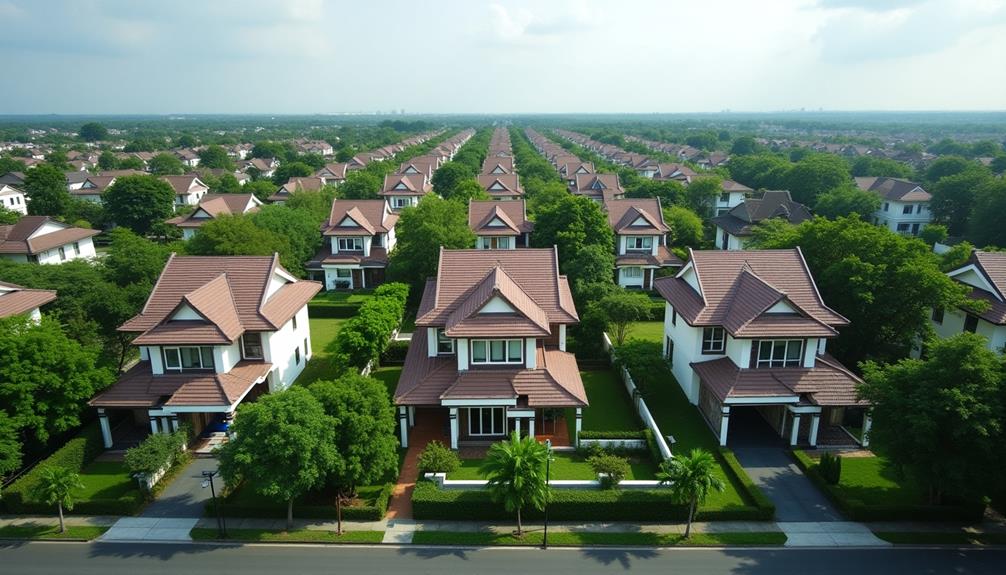
Understanding the available exemptions and reductions for property tax in Thailand can greatly mitigate the financial burden on landowners.
You'll be delighted to know that there are several tax exemptions and reduction criteria that could put a smile on your wallet. For instance, if your property is used for agricultural purposes, you might qualify for a significant tax relief. The government loves farmers, and they show it by offering generous breaks.
If your property is primarily a residential home and its appraised value doesn't exceed 50 million baht, congratulations—no tax for you!
And if it's your first home, you get a pass on the first 10 million baht of its value. Talk about rolling out the red carpet!
There are also reductions for properties used for public benefit or religious activities. Think temples and schools.
So, if you're planning to open a yoga retreat that doubles as a monastery, you might be in luck.
And here's a fun fact: if your property is vacant and unused, you might face higher tax rates, but there are still some quirky loopholes and exemptions available.
Who knew property tax could be so entertaining?
Payment Process
While it's great to know about the various exemptions and reductions available, you'll eventually need to navigate the payment process for property tax in Thailand. Let's break it down so you can handle it like a seasoned pro.
First, choose from various payment methods. You can pay online through government portals, at banks, or even via mobile apps. The Thai government has made it pretty convenient, so you can avoid lengthy queues and grumpy clerks.
When making payments, make sure you've calculated any tax deductions accurately. Miscalculations can lead to paying more than necessary or, worse, penalties.
To keep your stress levels low, consider these:
- Double-check your tax calculation: You don't want to overpay or underpay. Both can lead to headaches.
- Keep all receipts and documentation: Trust me, you'll thank yourself when you need proof of payment.
- Set reminders for due dates: Missing deadlines can lead to penalties that make you want to pull your hair out.
- Consult a tax advisor: If numbers make your head spin, get expert help.
- Use government resources: They're there to help, believe it or not!
Penalties for Non-Compliance
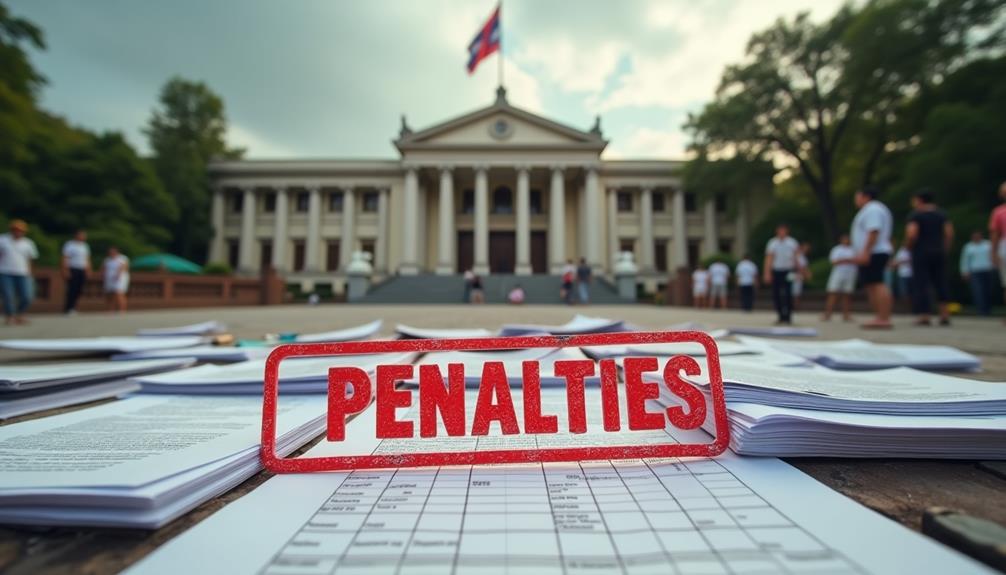
Ignoring property tax obligations in Thailand can lead to serious consequences. Envision this: You're sipping a coconut on a beautiful Thai beach, blissfully unaware that your failure to pay property taxes has triggered a bureaucratic hurricane.
Non-payment consequences aren't just a slap on the wrist; they're more like a smack with a legal hammer.
First, you'll face hefty fines that can make your wallet weep. These fines accumulate faster than you can say "Som Tum."
If you still ignore the red flags, the government might escalate the issue by freezing your assets. Yes, your beloved beach house could be on the chopping block.
Next, think of property seizure as the grand finale of this tax drama. If you continuously dodge your tax duties, the authorities can and will seize your property.
They might even auction it off to recover the unpaid dues. No more sunset views from your balcony if that happens.
Future Outlook
Given the severe repercussions of non-compliance, it's clear that property taxes in Thailand aren't something to overlook.
Looking ahead, Thailand's property market trends suggest a landscape that savvy investors should watch closely. The government's focus on tightening tax compliance might seem intimidating, but it also signals a maturing market, ripe with investment opportunities.
But let's get to the nitty-gritty. Here's what you can expect:
- Increased Transparency: Authorities are pushing for more transparent transactions. You'll know exactly what you're getting into.
- Market Stability: With stricter tax laws, expect fewer shady deals and more stable property values. It's like house-flipping with fewer nightmares.
- Foreign Investment: Thailand's stricter tax regime might initially scare off some, but long-term, it attracts serious investors who value stability.
- Tech Integration: Expect more digital solutions for managing property taxes. Imagine paying your dues without leaving your hammock.
- Economic Growth: Robust property laws could boost the economy, offering you more lucrative investment opportunities.
In essence, Thailand's evolving property market trends indicate a promising future.
Sure, the heightened scrutiny might make you sweat, but hey, no one said making smart investments was a walk in the park!

